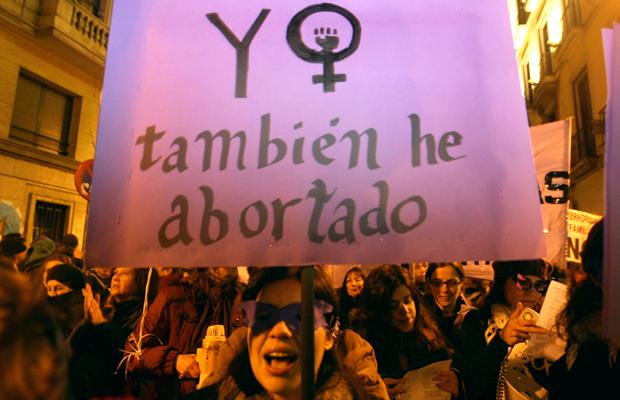Spain’s conservative leader looking to roll back legalization of abortion
A woman in Madrid carries a banner that reads, “I also had an abortion,” in a demonstration to mark International Women’s Day in 2010. (Photo by Andrea Comas/REUTERS.)
A liberalized abortion law in Spain could soon be amended, making the procedure once again criminal.
In 2006. Spain’s socialist government changed the law, allowing any woman to get an abortion up until the 14th week of pregnancy. Now the conservatives are back in power, and they want the restrictions back too.
Spain’s conservatives have long argued abortion is not a right, but a crime. In the old days, under dictator General Francisco Franco, there were three exceptions: in cases of rape, when woman’s health faced serious risks or if the fetus was deformed.
Now, the conservative government of Prime Minister Mariano Rajoy wants to bring the so-called “exceptions law” back — with additional limitations. Regardless of whether a fetus is deformed, his bill says, it must be delivered.
“The idea is that women who want to be mothers shouldn’t be able to get abortions due to social, economic and family pressures,” Ana Mato, Spain’s health minister, said recently.
Many conservative Spaniards, like Nicolas de Carcedeas with the local chapter of Right to Life, see the abortion bill as progressive — a long needed reform.
“If the abortion law is amended,” he told Spanish TV, “it would be the first time in 30 years that we see an advancement in the protection of life in Spain.”
Carcedeas urged the government not to delay, citing Spain’s roughly 300 daily abortions.
But Spanish society is split down the middle on what constitutes moving forward, or backward. When former socialist Prime Minister Jose Luis Rodriguez Zapatero first came to power in 2004 he passed a raft of so-called progressive laws. He liberalized abortion, legalized gay marriage and let same-sex couples adopt children.
Back then the economy was strong, and Zapatero capitalized on the country’s general sense of well being to advance his social causes.
There were protests, but by and large he was praised by Spanish liberals.
Socialist leader Purificacion Causapie said, with regard to abortion, Zapatero put Spain on par with most of the rest of Europe.
“Rajoy’s proposal,” she said, “would put us at the bottom of the line in Europe, with regard to rights and liberties for women.”
In his second term Zapatero dropped his social agenda, overwhelmed by the financial crisis. Today, Rajoy appears just as overwhelmed. But Spain’s sinking economy may be what’s allowing him to undertake a social about-face.
He may be betting that most people are too busy worrying about their jobs to object strenuously to his proposed restrictions on abortions.
And like Zapatero in his day, it could turn out to be the only arena in which Rajoy scores some points.
We want to hear your feedback so we can keep improving our website, theworld.org. Please fill out this quick survey and let us know your thoughts (your answers will be anonymous). Thanks for your time!
